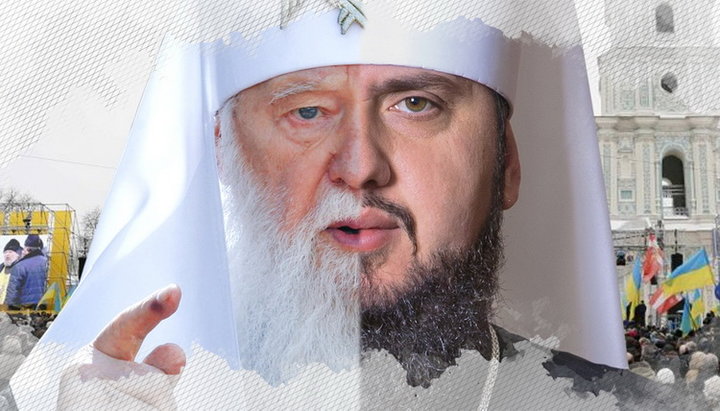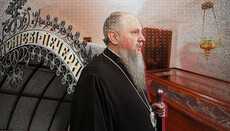Canonical three-ring circus: who and how leads OCU

In the newly-minted “Church” there is a complete administrativee chaos which for some reason does not bother the Patriarchate of Constantinople.
Long before the signing of the so-called “Tomos on the independence of the Ukrainian Church”, we said it would not bring the desired church independence to Ukraine, but instead the Orthodox world would face unprecedented canonical chaos. True, no one even in the worst dream could have imagined that this chaos would be so large-scale and turn into canonical lawlessness.
Sure, it can be affirmed that the process and the fact of granting the Tomos was already flagrantly lawless from the canonical point of view. Yet there are several essential details that show us that even in this case, the Phanariots and their new subordinates from the “holy church of Ukraine” managed to hit through the anticanonical bottom.
Selective blindness
Recently, it seems that Phanariots are experiencing an acute attack of canonical schizophrenia or, more precisely, selective canonical blindness. By invading the jurisdiction of another Church, which in official documents is called the “sister,” and overtly violating the rules of the Ecumenical Councils, Phanar claims that it acts within the framework of Orthodox canons.
There is neither logic nor common sense in these statements. After all, in order to speak about the canons in the context of the “Ukrainian issue”, it was necessary to cancel the agreement from three hundred years ago, declaring it null and void. This is the same as if Ukraine today declared its rights to Kholm Rus, having canceled interstate agreements from almost a century ago. Phanar takes it easy and, surprisingly, refers to Orthodox canon law, according to which the Archbishop of Constantinople has the right to receive appeals from other bishops.
Furthermore – having invaded the territory of another Church, Phanar for some reason is indignant at the fact that this Church itself establishes its parishes in its territory. Such a one-sided position looks, you see, very bizarre.
Moreover, within the Constantinople Patriarchate itself, they prefer not to notice the canonical mayhem going on in Ukraine. However, they themselves provoked this lawlessness. For example, by the text of the Tomos.
Tomos and canons – what way are they alike?
First, by establishing its right to possession of the foreign parishes of the former UOC KP, Phanar invades the territory of at least four Local Orthodox Churches.
Secondly, the presence of any exarchates in the territory of the autocephalous Church (namely autocephalous as it was proclaimed for the OCU), from the point of view of canonical law, is simply nonsense. After all, the exarchate is “a large church area lying outside the country where the patriarchate is located”.
Interestingly, Byzantium originally created exarchates on lands conquered from the barbarians. Exarchates were often quite militarized units with centralized control, while exarchs themselves performed the functions of ecclesiastic, as well as military and civilian power. Therefore, the creation of exarchates in the territory of the autocephalous Church is unthinkable.
Thirdly, the Tomos prescribes the right of the Patriarchate of Constantinople to own Stavropegia throughout the territory of Ukraine. However, the situation with these Stavropegia is even more strange than with exarchates. It is not clear, for example, which churches will have the status of Stavropegion. For a time the Kiev-Pechersk Lavra used to be a Stavropegion of the Constantinople Patriarchate. Today it is not only the UOC monastery, but also a national reserve. Will it be given to Phanar? Hardly. Then what kind of temples are we talking about? Where is the official list of these Stavropegia? And by virtue of what canons will they be created?
Fourthly, on the basis of what canons does Phanar consider itself entitled to dispose of the so-called "emigrant parishes" and the Diaspora? There are no canons allowing this. There is a decision of the Synod of Constantinople Patriarchate dated March 1 “on compulsory and exclusive submission” to it of the entire Orthodox Diaspora and all Orthodox parishes and dioceses located outside the borders of the countries within which the Local Orthodox Churches reside ... This is how the previously non-existing doctrine of special jurisdictional rights of the Patriarch of Constantinople emerged.
So, if the so-called Tomos contains so many canonical violations, is it any wonder what is happening inside the newly formed structure having been born out of such a document?
For example, a great surprise is the epic of the patriarchate of Mikhail Denisenko. What is he – patriarch or not?
Patriarch or not patriarch?
Judging by his own statements, he is a patriarch. We remember how he told reporters: “I was a patriarch, I am and I will be!” Then many thought that Mikhail Antonovich simply made a reservation and later he himself would refute his words. But, as it turned out, it was not a reservation, but a firm position, reaffirmed by him many times.
For example, during his visit to Chernigov region Filaret said, “These rumors are spreading that the patriarch will not stand for office and will resign. This is totally untrue. I will be a patriarch to death because the enthronement took place in 1995 and no one will take this grace from me.”
Moreover, the words of Filaret found support with his immediate environment, and even the opinion was common that he alone should take the post of head of the newly created “Church”. Spokesman for the UOC KP Eustraty Zoria claimed that no one except Filaret can be elected as a head of the OCU: “We see that Patriarch Filaret has the greatest public authority among current hierarchs in Ukraine. Both from the point of view of church leadership and from the point of view of life experience there is no better candidate. Therefore, the UOC KP will nominate Patriarch Filaret as the head of the united Church ... The Ukrainian Church is over 1,000 years old. And if it were not for the efforts of Patriarch Filaret, then perhaps we would have addressed the issue of Tomos for another 100 years. We must look at things realistically. I have a question: who can be offered in return? If it is just someone, then what for?”
He also assured the Ukrainian society that there were simply no other candidates for the post of the head of the OCU except Filaret: “There will be an opportunity to nominate other candidacies, but there are no others so far.”
Anyway, not patriarch
Such simultaneously made statements by representatives of the Ukrainian schism seriously alarmed Phanar. After all, as it became known a little later, the figure of Mikhail Denisenko in the eyes of the Phanariots looked (and seems to be) so odious that his absence in the capacity of even a possible candidate for the post of the head of the OCU was one of the mandatory conditions for receiving Tomos.
The representative of Phanar, Archbishop Job (Getcha), hastened to voice an idea that Filaret and Makariy for the Constantinople Patriarchate are metropolitans at best. But both – without the chair.
The fact that Phanar demands that Filaret withdraw his candidacy was not denied by anyone. At the same time, to the very end, or rather, to the very beginning of the “unification council,” Mikhail Antonovich tried to bargain at least some more or less acceptable conditions for himself from Phanar. In his official address, he hinted that negotiations were carried on and that he would take a decision, guided solely by the good of the “Church”:
“Now I have a formed vision of how to proceed further, and our partners in a dialogue know about it through our personal communication, which is still under way. I assure that within the framework of this dialogue, we have adhered to and will continue to adhere to the obligations assumed, just like its other participants.
What will be my response to the election proposal mentioned above, if it is announced officially at the Council – I will also officially inform the Council, justifying my vision and decision before it begins and expecting it to support my position.
The reason for an answer will be solely awareness of the good for the Church and responsibility before the Lord for the proper fulfillment of the service entrusted to me on the throne of Kiev, which I, by God's mercy, have been carrying out for more than 52 years.”
“I was a patriarch, I am, and I will be!”
Filaret Denisenko
In order to stop further “I will – I will not” games, Phanar, through an information source close to itself, warned Filaret that everything could end very badly.
That is why already at the very "Sobor" Mikhail Antonovich distanced himself from the opportunity to take the post of the OCU head and later commented on his position as follows: "If I had not yielded, we would not have reached the union and received Tomos on autocephaly of the Ukrainian Church."
Or still “patriarch”?
However, despite this, Filaret did not give up his cherished dream to die as a patriarch. He told the media about his vision of how the new “Church” would be managed in the future. According to him, Epiphany is assigned the role of a person who represents a new structure in the international arena. But internal management issues will remain in the hands of Filaret. In addition, he is confident that the situation will change radically when the OCU receives the status of patriarchy because in this case Filaret will be in charge of both foreign and domestic policies.
For this reason, Filaret still continues to use the patriarchal regalia (for example, the koukoulion), during the “divine services” he is commemorated as the “patriarch”, and he assures everyone that he remains the “primate” of the new “Church”.
Admit it that a situation, in which one Church is led by at least two primates, is simply blatant from the canonical point of view.
Metropolitan’s fun and frolic
Perhaps, that is why Phanariots simply do not notice (or pretend not to notice?) other canonical absurdities the clerics of the "holy church" undertake.
A few days ago, former metropolitan Alexander (Drabinko) of Pereyaslav-Khmelnitsky and Vishnevoye blessed the Kolomyia church community to pass to the OCU. The question what status Vladyka Alexander, who was ordained bishop of the UOC and was considered to be a vicar bishop, has in the structure of the Patriarchate of Constantinople, remains open. After all, if he performs the functions of a “vicar bishop” in the OCU, then, according to the canonical law of the Church, he has no right to make such “blessings”. And if he is today a ruling "bishop", then you need to ask him what chair he occupies, who is directly subordinated to him, etc.
In the same way, another former UOC bishop, Metropolitan Simeon (Shostatsky), acts against the canons. For example, quite recently he appealed to the court with a request to reinstate him at the UOC.
So, when Epiphany promises that in his activities he will rely on the canons of the Church and faithfully defend them, it makes us at least wonder – what canons and what Church are we talking about? After all, judging by the rules of the Holy Orthodox Church, which is shown by Phanar and its offspring “holy church of Ukraine”, Epiphany means some special "canons" that are being created right before our eyes. They are created without God but only with the help of the powers that be. However, as the Holy Scripture says, without the help of God it is all in vain: “If the Lord does not build up a house, in vain is the labor of he who builds it” (Ps. 126, 1).











